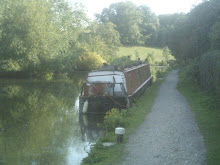Wednesday, 30 September 2009
Looks different?
Continuous Cruising
Postscript - 30 Sept 09 - In the last 48 hours Narrowboatworld has taken down the full thread. Any of you who got round to reading the original will have seen that as ever when one tries to have a meaningfully discussion on this issue, someone has to spoil it by insisting that they are right and everyone else is wrong. Funny how often this happens when this subject comes up!? (What little is now left is here.)
Someone is actually reading my blog!
I often bang on about how unresponsive some parts of BW are to people's gripes and complaints so it's always encouraging to identify and credit those staff who do respond promptly and effectively to the punters (and don't think I don't know that there are a lot of you out there who work hard to make sure you fall into this category).
Just cos I think many of your senior managers and leaders are incompetent, don't take that to mean I take the same view about most of the 'the workers'.
If any one has problems or issues with the site you know now, thanks to Paul's helpful response, where to seek help. Good stuff. Thanks again Paul for your positivity.
Monday, 28 September 2009
Lammas Project wins planning permission
NEWS RELEASE August 2009 First Eco-Village in
Lammas, the group behind the innovative eco-village, first applied for planning permission in June 2007. After being refused twice by Pembrokeshire County Council the group appealed to the Welsh Assembly Planning Inspectorate and following a well attended public hearing have finally won permission.
The project has met a mixed reaction from local people despite promising a range of benefits including new footpaths, a seasonal shop, fresh local produce and a minibus service.
Continuous Cruising
| Seems that I and other contributors managed to re-ignite some debate about Continuous Cruisers and Council Tax on Narrowboatworld's Forum recently! This started from some confusion about NABO's view on the subject of whether Continuous Cruisers should pay more. You can see how the debate went in this case by reading the forum but I thought I'd post the key arguments I made on NABO's behalf here too. For the avoidance of doubt it is not NABO policy that Continuous Cruisers should pay a higher BW licence fee than those with long term moorings. We remain committed defenders of the position that your standard BW craft licence should be a universal licence, allowing the boater to travel around the network (or the river they are based on in the case of River Registration) as much or as little as they wish. |
Sunday, 27 September 2009
Moorings Tenders are now Auctions
Unfortunately they have not been scrapped but have been replaced by Moorings Auctions! https://www.bwmooringvacancies.com/index.php
However in best BW fashion it seems the revised website has not been tested properly before being launched. I can find no instructions as to how to bid for auction lots posted on the site. The link to the information sheet on how to bid was not working this morning (Sunday 27 Sep 09) despite the fact there are twenty berths advertised as available for bids.
Another famous administrative cock up at BW? Doubtless the fact that the auction site that doesn't seem to contain the bidding instructions will simply be dismissed by BW as "teething troubles"?!
I registered as an interested bidder under the old system but have received no communications from BW about the changes to the system! Loathsome as it is to me, it is hardly going to work if those who have registered an interest in bidding for vacancies aren't provided with instructions.
This is one I will keep watching I think!
Friday, 4 September 2009
Grow your own as a national food policy
Cuba for many years relied on its political relationship with the Soviet block for cheap food and fuel imports. That arrangement collapsed when the Soviet communist system went down.
The programme touched on how in response consumption in Cuba has had to fall and how local food production had to rise. As a result Cuba has put huge amounts of urban open space over to urban farms which grow and distribute local produce in the communities where it is produced. This got be onto doing some searches for more background on these events.
As part of their response to this Cuba has been forced to develop and implement low impact food growing techniques. It has to be low impact because Cuba does not have the money to industrialise its food production. One outcome seems to be a huge return to the land and a lots of investigation and application of approaches to production which many of us in this part of the world who have looked into these things would recognise as permaculture and organic techniques.
There is lots more stuff on the story on the web if you search Cuba plus the key word in the links above. I've just liked to the three articles I found most authentic.
On Youtube there is also a series of films 'Cuba and Peak Oil' which I have found interesting. The title maybe hides the fact that a great deal of this film focuses on food production issues arising out of the local peak oil scenario that Cuba went through. As of today the film is available from this page.

